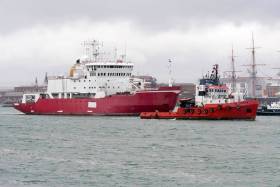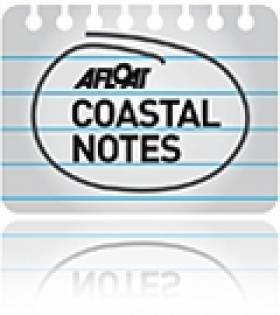Displaying items by tag: HMS Endurance
Former Antarctic Patrol Vessel HMS Endurance Named in Honour of Shackleton’s Ship Scrapped
#ShackletonShips - The Ross Sea announced as the World’s largest marine park in the Antarctic is where ice patrol survey ship HMS Endurance nearly sank in the south Atlantic in 2008. Since then the ship has remained laid up, however in recent months she was scrapped, writes Jehan Ashmore.
HMS Endurance (A171) a former Royal Navy vessel based in the polar seas was named in honour of Sir Ernest Shackleton’s original expedition sail and steam ship Endurance.
The three-masted barquentine, Endurance was crushed by pack ice and sunk more than a century ago in late 1915. The incident took place during the Imperial Trans-Antarctic expedition of 1914-1918 led by the Irish born polar explorer. A 15ft model of the ship is on display in the Athy Heritage Museum, Co. Kildare and more recently a statue of Shackleton was unveiled.
The 1995 built HMS Endurance had a near floundering incident in December 2008 while off Chile. The 5,129 gross tonnage vessel suffered flooding of her engine room that nearly sank her, following an error during routine maintenance on a sea suction strainer.
The damage was so severe that HMS Endurance was transported by semi-submersible ship to the UK, firstly Dartmouth and then Portsmouth Naval Base. It was deemed far too expensive to carry out repairs and she was sold for scrap in 2013, however since Afloat’s coverage almost three years ago, the towage of the vessel only took place in June when bound for breakers in Turkey.
She had been employed as a hydrographic and support vessel for British Antarctic Survey (BAS), which is responsible for the UK's national scientific activities in Antarctica. A £150m newbuild RRS Sir David Attenborough currently under construction will join her fleetmates as outlined below.
HMS Endurance was originally built as MV Polar Circle for Norwegians in 1990, then chartered to the Royal Navy and purchased. The navy equipped the vessel with Lynx helicopters as BAS aircraft cannot reach certain locations in the vast polar expanse.
Currently, the Royal Navy’s presence in these polar waters and the South Atlantic is tasked to HMS Protector (A173). Likewise of her predecessor, she operates along with BAS ships.
They are the civilian-manned polar research vessels, RRS Ernest Shackleton and RRS James Clarke Ross. The naming of the ship honours that of the British explorer who in 1841 visited the area (Ross Sea) located in southern Antarctica.
Shackleton’s 'Present Day' Endurance Faces the Scrap-Yard
#ShackletonShips – With attention focused on job losses at BAE Systems shipyards in Scotland and Portsmouth which is to cease shipbuilding in 2014, the Royal Navy base is also home to the former Antarctic ice patrol survey vessel, HMS Endurance, writes Jehan Ashmore.
As previously reported, the fate of HMS Endurance, which was named in honour of the 'original' Endurance which sank after trapped in ice during Sir Ernest Shackleton's Imperial Trans-Antarctic expedition of 1914-1918, and according to Ships Monthly is now likely to be scrapped.
HMS Endurance, albeit not built at Portsmouth's historic shipyard that notably launched King Henry VIII's Mary Rose (see new museum) more than 500 years ago, also suffered a serious incident having nearly foundered off Chile in 1991. She was towed to the UK but was never repaired.
As previously reported on Afloat.ie, there are two other vessels directly named in honouring the famed Irish-born polar explorer.
Firstly is the 1995 built RRS Sir Ernest Shackleton which was originally MV Polar Queen built for Rieber Shipping of Bergen.
Ships Monthly also reports that the Norwegian company recently sold sister MV Polar Protector (A173) to the UK Ministry of Defence for £51m as the current Royal Navy patrol and survey vessel for the South Atlantic and Antarctic.
The second vessel is the Dublin Port Company tug Shackleton named in 2010.

























































